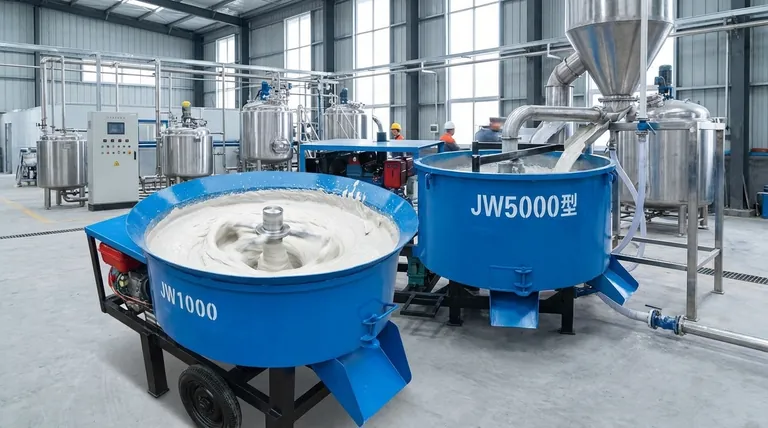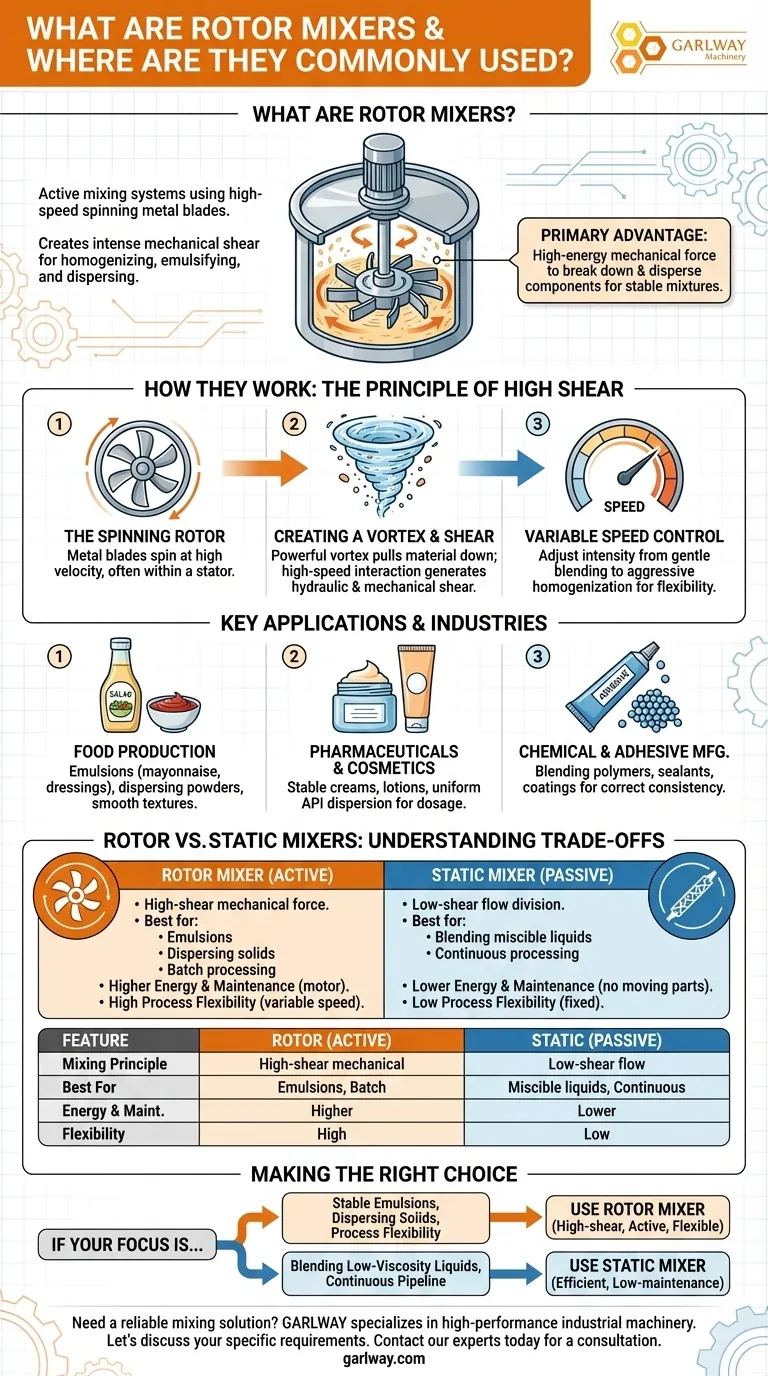At their core, rotor mixers are active mixing systems that use metal blades spinning at high speeds inside a container. This rotational force creates intense mechanical shear, making them essential tools for homogenizing, emulsifying, and dispersing materials in industries like food production, pharmaceuticals, adhesives, and chemical processing.
A rotor mixer's primary advantage is its use of high-energy, mechanical force to combine materials. Unlike passive systems, it physically breaks down and disperses components, making it ideal for creating stable mixtures from difficult-to-blend substances.

How Rotor Mixers Work: The Principle of High Shear
The effectiveness of a rotor mixer comes from its simple but powerful design. It excels at applying localized, intense energy directly into the materials being processed.
The Spinning Rotor
The heart of the system is the rotor, which consists of metal blades at the bottom of a mixing vessel. This rotor spins at high velocities, often within a stationary outer piece called a stator.
Creating a Vortex and Shear
As the rotor spins, it creates a powerful vortex, pulling materials from the surface down into the mixing head. The high-speed interaction between the spinning rotor and the material generates intense hydraulic and mechanical shear, which is necessary to break down droplets and particles.
The Role of Variable Speed
Most industrial rotor mixers feature variable speed controls. This allows operators to adjust the intensity of the shear, from gentle blending to aggressive homogenization, tailoring the process to the specific requirements of the product.
Key Applications and Industries
The ability to generate high shear makes rotor mixers indispensable across a wide range of manufacturing processes where creating stable and uniform products is critical.
Food Production
In the food industry, rotor mixers are used to create emulsions like mayonnaise and salad dressings, disperse powders into liquids for sauces and beverages, and ensure smooth, consistent textures.
Pharmaceuticals and Cosmetics
These mixers are vital for creating stable creams, lotions, and ointments. They ensure that active pharmaceutical ingredients (APIs) are uniformly dispersed throughout a base for consistent dosage and effectiveness.
Chemical and Adhesive Manufacturing
For adhesives, sealants, and coatings, rotor mixers blend polymers and other components with varying viscosities. This ensures the final product has the correct consistency and performance characteristics.
Understanding the Trade-offs: Rotor vs. Static Mixers
To fully appreciate the role of a rotor mixer, it's helpful to contrast it with a different technology, such as a static mixer, which has no moving parts.
Energy and Maintenance
A rotor mixer is an active system requiring a motor, which consumes energy and involves moving parts that need maintenance. A static mixer is a passive system with no moving parts, relying solely on the flow of the material, resulting in lower energy and maintenance costs.
Processing Type
Rotor mixers are ideal for batch processing, where ingredients are loaded into a tank and mixed for a set duration. Static mixers are designed for continuous, in-line processing, mixing materials as they flow through a pipe.
Application Focus
The high shear of a rotor mixer is necessary for creating stable emulsions or dispersing solids into liquids. A static mixer is better suited for blending miscible, low-viscosity liquids that combine more easily.
Making the Right Choice for Your Goal
Selecting the correct mixing technology depends entirely on the materials you are processing and the final product characteristics you need to achieve.
- If your primary focus is creating stable emulsions or dispersing solids in a batch: A rotor mixer is the correct tool due to its high-shear, active mixing capability.
- If your primary focus is blending low-viscosity liquids in a continuous pipeline: A static mixer is a far more efficient and lower-maintenance solution.
- If your primary focus is process flexibility for different products: The variable-speed control of a rotor mixer offers significant advantages for handling a range of viscosities and mixing requirements.
Ultimately, understanding the physical forces your materials require for proper integration is the key to selecting the most effective mixing technology.
Summary Table:
| Feature | Rotor Mixer (Active) | Static Mixer (Passive) |
|---|---|---|
| Mixing Principle | High-shear mechanical force | Low-shear flow division |
| Best For | Emulsions, dispersing solids, batch processing | Blending miscible liquids, continuous processing |
| Energy & Maintenance | Higher (motor required) | Lower (no moving parts) |
| Process Flexibility | High (variable speed control) | Low (fixed by design) |
Need a reliable mixing solution for your production line?
GARLWAY specializes in robust industrial machinery, offering high-performance equipment for demanding applications. Whether you're a contractor or a large construction company, our expertise can help you optimize your processes.
Let's discuss how we can provide a mixing solution tailored to your specific requirements.
Contact our experts today for a consultation
Visual Guide

Related Products
- Ready Mixer Machine for Construction Ready Mix Machinery
- HZS75 Concrete Batching Plant Cement Mixer Price Concrete Mixer Bunnings Mixing Plant
- Concrete Cement Mixer Machine Drum Mixer for Construction
- HZS25 Best Cement Mixer for Quick Mix Concrete at Bunnings
- Shaft Mixer Machine for Cement and Regular Concrete Mixing
People Also Ask
- When was the first concrete mixer developed and by whom? Discover the 1900 Breakthrough
- Which type of projects require a concrete mixer? Essential Guide for Construction Pros
- Why is cleaning a concrete mixer after use important? Avoid Costly Repairs and Ensure Quality
- What should be considered regarding the output of a concrete mixer? Match Capacity to Your Project Scale
- What safety considerations are important for concrete mixer operation? A Guide to Proactive Risk Management



















